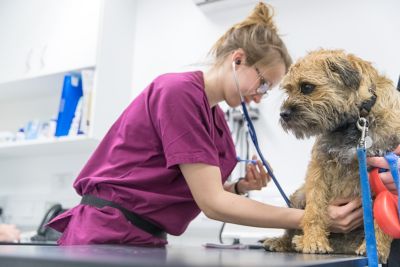
We know how important real-life, clinical experience is for your learning. From day one of your course, you will get hands-on experience with live animals so you can start to develop your skills.
Through our partnerships with local clinical associates, you will gain invaluable experience in veterinary education and research in real practices. This is known as a rotation.
What is a clinical associate?
Our clinical associates are simply local businesses which care for animals. This could be a vet, animal shelter or zoo. They work in partnership with us, offering rotation places for our students.
When will I complete clinical practice?
Clinical experience is completed in your lecture-free final year, through dedicated clinical practice modules. You will work alongside local clinical staff and university academic staff placed at clinical associates.
What will I learn?
Clinical practice modules provide experience of all domestic species, livestock production systems and wildlife conservation, as well as pathology and public health.
This teaching approach gives you experience of first and second opinion cases, resulting in the completion of 'day one' competencies.
What are ‘first and second opinion’ cases?
‘First opinion’ is what most vets see every day (i.e. someone brings an animal to see them with an unknown issue). ‘Second opinion’ are referral cases, where expertise beyond the first opinion general practitioner is required.
What are ‘day one’ competencies?
This is a list of items set by the Royal College of Veterinary Students, outlining what a veterinary graduate can be expected to do.
How will I learn?
Teaching and learning are based on observation, discussion and practical experience. You will be under the supervision of university academic staff placed at, and working within, these clinical associates.
Our clinical associates
- Ark Vets
- Bishopton Farm Vets
- Defence Animal Training Regiment
- Dick White Referrals
- Dovecote Veterinary Hospital
- LLM Farm Vets
- Oakham Veterinary Hospital
- PDSA
- Pinfold Vets
- Pool House Equine Clinic
- Rainbow Equine Hospital
- RSPCA (Bolton and Leicester)
- Scarsdale Veterinary Group (Farm and Equine)
- Scarsdale Veterinary Group (Pride Veterinary Centre)
- Tiggywinkles Wildlife Hospital
- Twycross Zoo
- Tyndale Farm Vets
- Vets4Pets (Eastwood)
- Wright and Morten Farm Vets
















